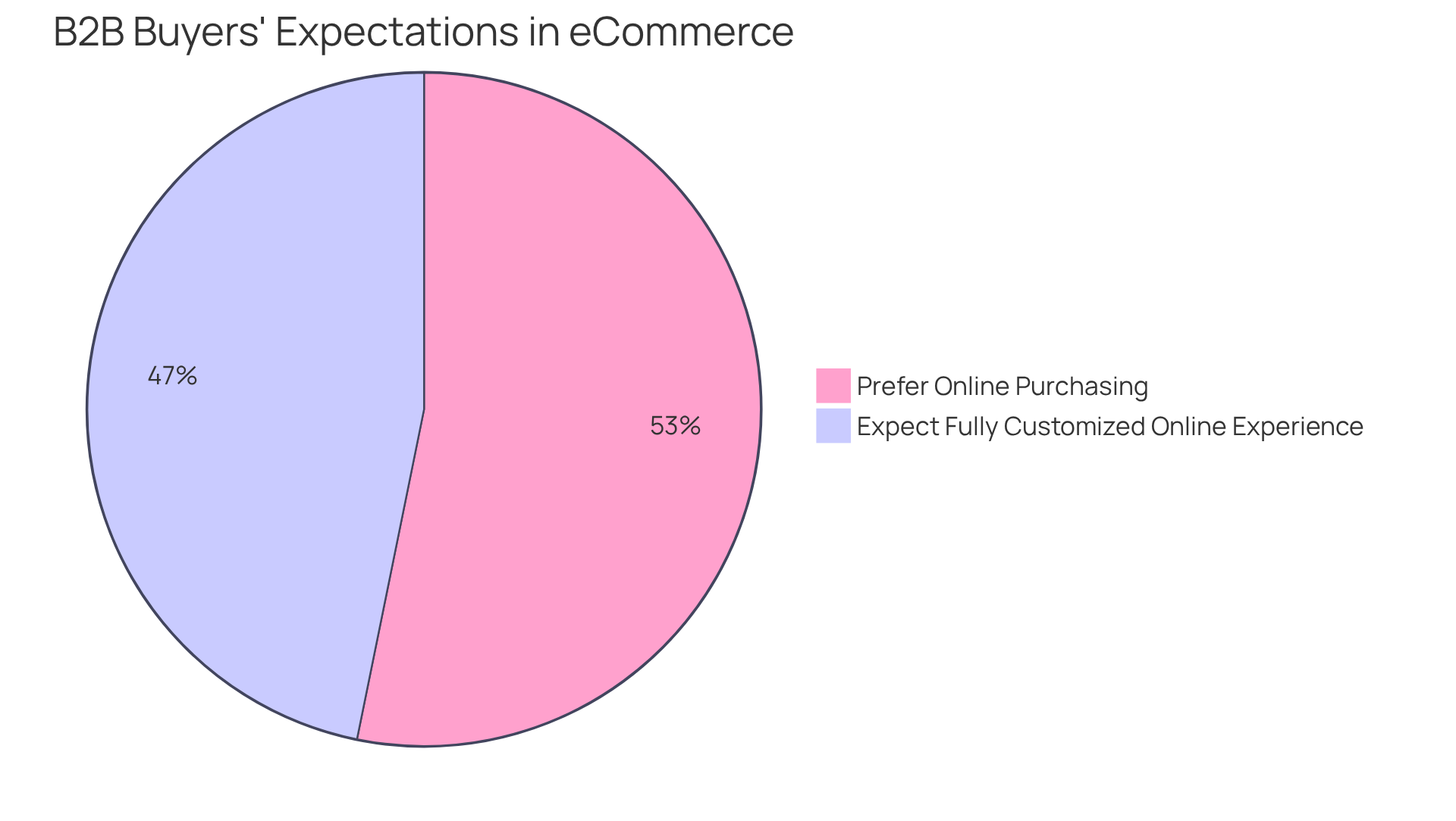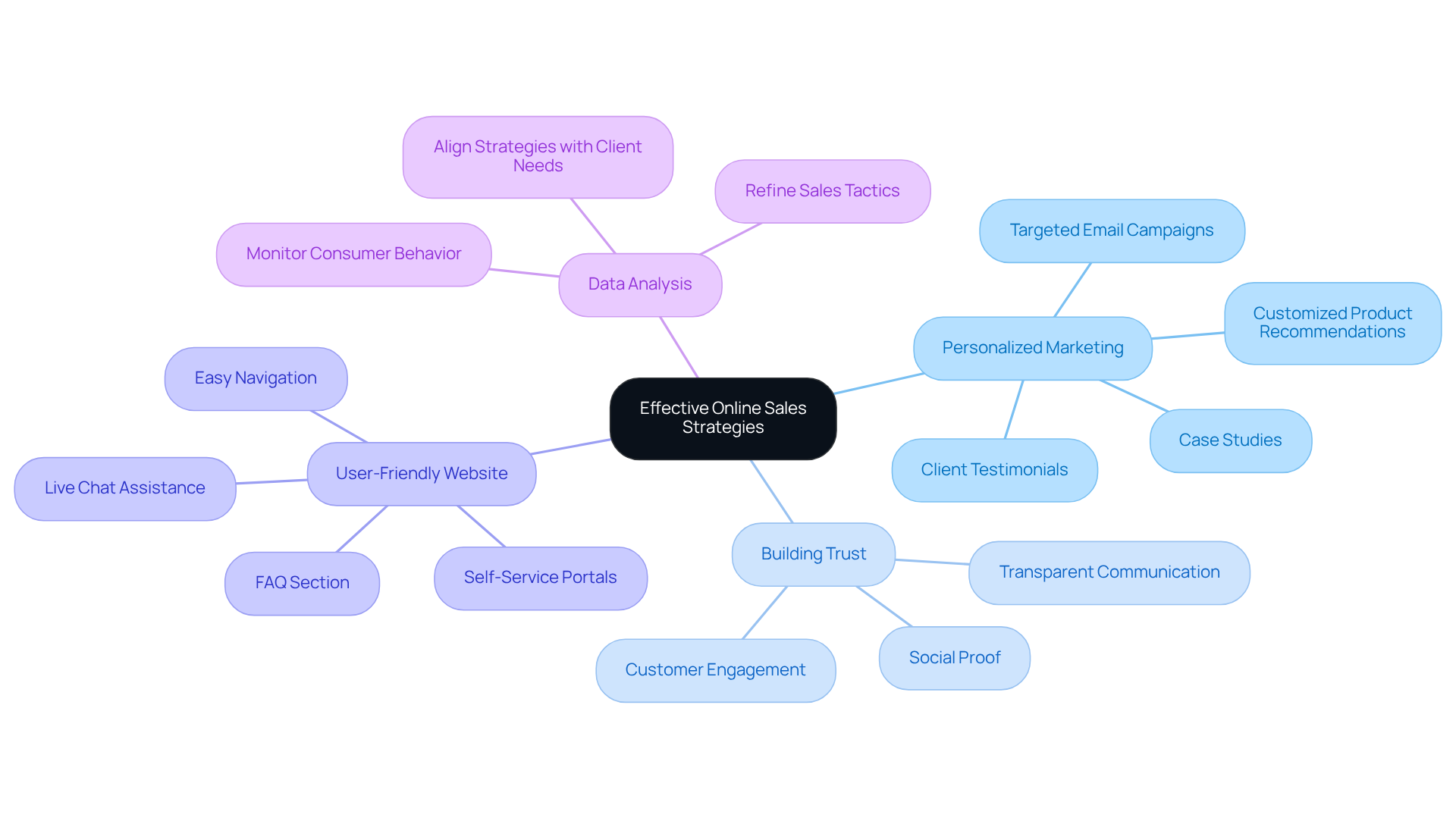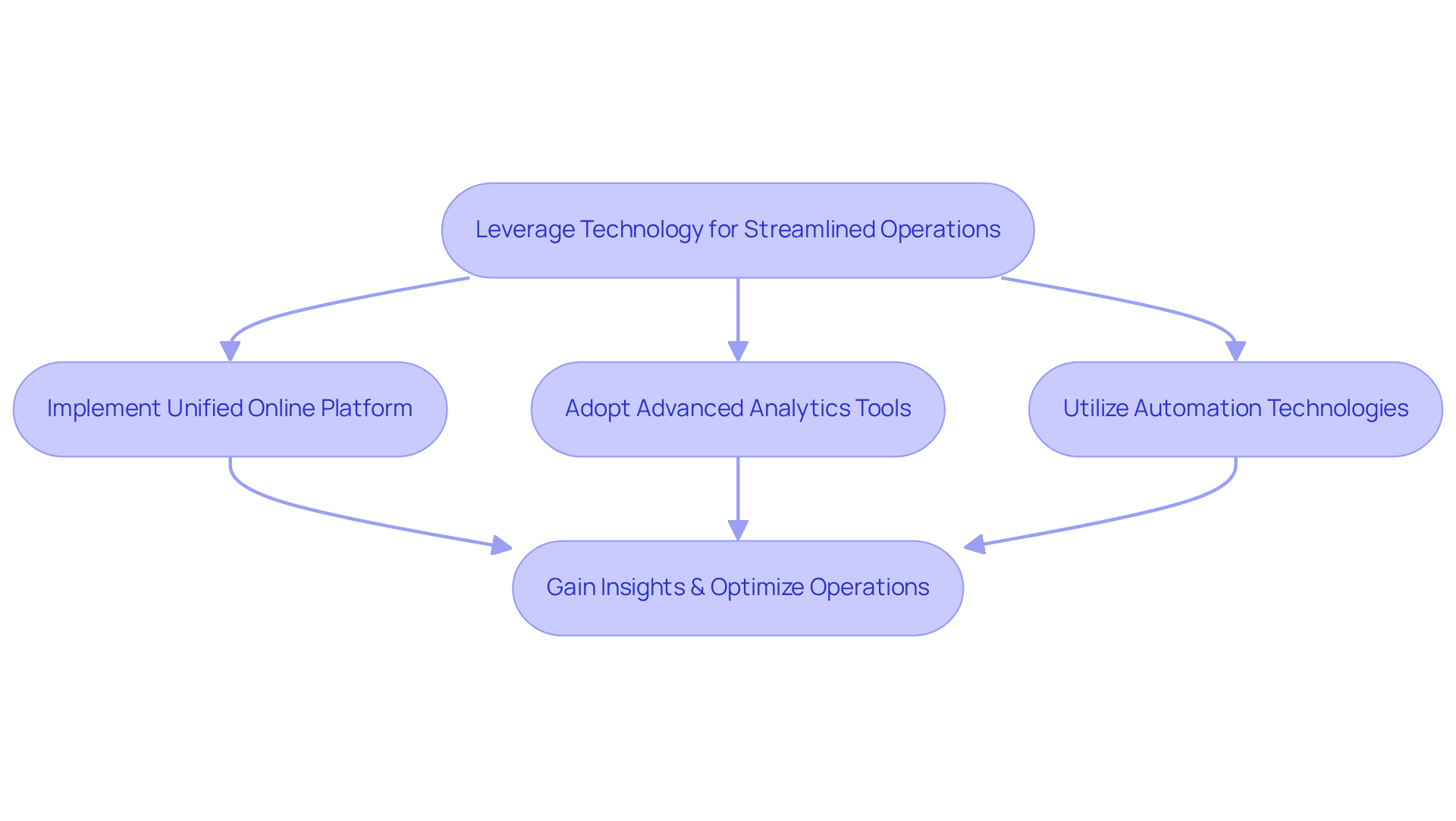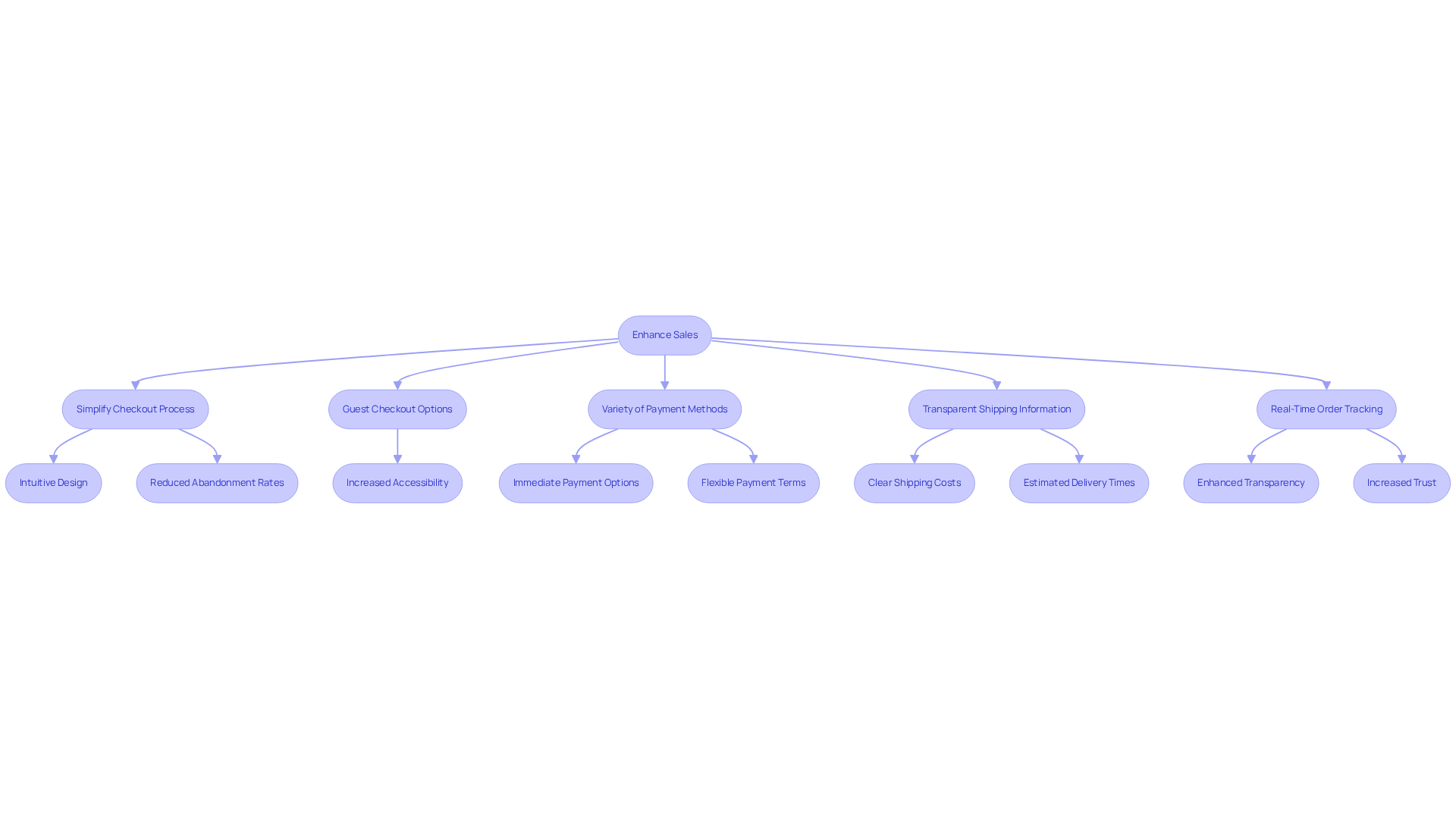Overview
In the ever-evolving landscape of B2B eCommerce, manufacturers face significant challenges that require immediate attention. To drive growth, it is crucial to understand client needs, implement effective online sales strategies, leverage technology, create a seamless purchasing experience, and enhance customer engagement.
Data reveals that a substantial percentage of B2B buyers expect personalized online experiences. By adopting these strategies, manufacturers can not only improve operational efficiency and customer satisfaction but also achieve sales growth in a competitive digital marketplace.
The time to act is now; embracing these approaches will position manufacturers to thrive in an increasingly demanding environment.
Introduction
Manufacturers navigating the intricate landscape of B2B eCommerce encounter a distinct array of challenges, ranging from complex product offerings to the pressing need for personalized customer interactions. With projections indicating that 75% of B2B buyers will prefer online purchasing by 2024, it is imperative for manufacturers to not only recognize these challenges but also to address them effectively for sustainable growth.
This article delves into five strategic approaches that manufacturers can adopt to bolster their online presence, engage customers meaningfully, and ultimately drive sales within a fiercely competitive digital marketplace:
- Enhance Product Information
- Implement User-Friendly Online Platforms
- Foster Personalized Customer Interactions
- Leverage Data Analytics
- Embrace Omnichannel Strategies
How can manufacturers harness these strategies to revolutionize their operations and meet the evolving expectations of their clients?
Understand the Unique Needs of Manufacturers in B2B eCommerce
Producers face significant challenges in the b2b ecommerce for manufacturers landscape, including complex product ranges, lengthy sales cycles, and the necessity for personalized client interactions. Recognizing the importance of understanding their clients' unique needs, preferences, and pain points is crucial for producers aiming to connect effectively with their target audience. This understanding requires , leveraging client feedback, and analyzing purchasing behaviors to create tailored solutions that enhance the overall experience.
For instance, a producer of industrial equipment must provide detailed product specifications, installation manuals, and robust after-sales support to meet client expectations. By grasping these requirements, producers can cultivate a more effective online presence that caters specifically to their clientele, ultimately fostering increased customer satisfaction and loyalty.
- 66% of B2B buyers expect a fully customized online experience.
- Organizations that adapt their strategies for b2b ecommerce for manufacturers are better equipped to thrive in the competitive digital marketplace.
- 75% of B2B purchasers are projected to prefer online purchasing by 2024.
The urgency for producers to enhance their B2B ecommerce for manufacturers capabilities is clear. Learning from successful transformations, such as Greenball Tire's digital evolution, allows producers to witness the tangible advantages of understanding and addressing client needs.

Implement Effective Online Sales Strategies for Enhanced Customer Engagement
To enhance client interaction, producers must adopt diverse online sales tactics tailored to the specific needs of their B2B partners in the realm of . The implementation of personalized marketing techniques is vital; targeted email campaigns and customized product recommendations based on prior purchases can significantly elevate engagement levels. Moreover, leveraging social proof—such as client testimonials and case studies—establishes trust and credibility with prospective buyers, thereby reinforcing the importance of the manufacturer’s offerings. Notably, with 85% of B2B organizations operating an eCommerce storefront, building trust is paramount in the realm of B2B ecommerce for manufacturers.
Creating a user-friendly website emerges as another effective strategy. A well-structured site promotes easy navigation and delivers comprehensive product information. Features like live chat assistance and self-service portals enhance the client experience, enabling users to quickly find solutions to their inquiries. For instance, producers that integrate a detailed FAQ section alongside live chat capabilities can significantly reduce response times and boost client satisfaction. Furthermore, the growing recognition of the necessity for B2B companies to establish transactional websites for facilitating online orders highlights the importance of B2B ecommerce for manufacturers, as underscored by industry experts.
Employing data analysis to monitor consumer behavior and preferences allows producers to continually refine their sales tactics. By aligning their strategies with the evolving needs of their clients, producers can secure ongoing engagement and loyalty in a competitive marketplace. This data-driven approach not only enhances client interactions but also empowers producers to respond proactively to market shifts. As Andrea Evans aptly notes, "If you had a magic wand and could make one thing happen for our B2B clients this year, what would it be? Make your site transactional!

Leverage Technology for Streamlined Operations and Data-Driven Insights
Manufacturers face significant operational challenges, yet they can greatly enhance their operations and gain valuable insights by leveraging technology. Implementing a unified online commerce platform, such as Equip360, empowers producers to effectively oversee stock, manage orders, and evaluate sales information in real-time. This integration not only but also provides critical insights into customer behavior and market trends. Notably, 39% of producers identify revenue growth as a key advantage of B2B ecommerce for manufacturers, underscoring the necessity of adopting such platforms.
Advanced analytics tools further enable producers to discern purchasing patterns, facilitating informed decisions regarding product offerings and marketing strategies. For instance, by analyzing sales data, a manufacturer may uncover that specific products experience heightened demand during certain seasons, allowing for optimized inventory management and targeted marketing efforts. Furthermore, 66% of B2B buyers anticipate a fully tailored online buying experience, highlighting the urgency for integrated online retail solutions in today’s market.
Moreover, the adoption of automation technologies can significantly reduce manual processes, minimize errors, and enhance overall productivity. Automating order processing and fulfillment, for example, can lead to faster delivery times and improved client satisfaction, ultimately fostering repeat business. As Ram Chandel from Deloitte aptly notes, "Customers today prioritize sellers who offer digital tools — and they’re spending more with those sellers." As producers increasingly recognize the importance of B2B ecommerce for manufacturers, they position themselves to thrive in a competitive environment.

Create a Seamless Purchasing Experience to Drive Sales
To enhance sales, manufacturers must prioritize the establishment of a seamless buying experience using B2B eCommerce for manufacturers. This necessitates the simplification of the checkout process, ensuring it is both intuitive and user-friendly. Features such as:
- Guest checkout options
- A variety of payment methods
- Transparent shipping information
can significantly elevate the purchasing experience.
Moreover, providing clients with the ability to track their orders in real-time enhances transparency and fosters trust. Manufacturers should also contemplate the implementation of a robust client relationship management (CRM) system to effectively manage client interactions and streamline communication throughout the purchasing process.
For example, a producer that offers a straightforward online ordering platform, coupled with proactive updates regarding order status and delivery schedules, can substantially boost client satisfaction. Statistics reveal that:
- 80% of parts orders transition to digital channels within a year of adopting eCommerce, highlighting the urgency of refining the checkout process.
- Companies that provide immediate, customized payment options at checkout experience a notable increase in purchase completion rates, as buyers are more inclined to finalize purchases when these options are readily available.
By concentrating on the creation of a frictionless purchasing experience, manufacturers can improve their B2B eCommerce for manufacturers, driving sales and cultivating . Integrating ERP systems can further enhance the purchasing experience by providing real-time access to customer-specific pricing and inventory.

Conclusion
Understanding the unique challenges faced by manufacturers in the B2B eCommerce landscape is essential for driving growth and enhancing customer relationships. Recognizing the specific needs of clients and adapting strategies accordingly allows manufacturers to create tailored solutions that not only meet but exceed expectations. This approach fosters deeper connections and loyalty, ultimately positioning businesses for success in a competitive digital marketplace.
Key strategies highlighted include:
- Implementing effective online sales techniques
- Leveraging technology for streamlined operations
- Creating a seamless purchasing experience
Personalized marketing efforts, user-friendly websites, and advanced analytics tools are crucial for engaging clients and optimizing sales processes. Furthermore, the integration of robust systems can significantly enhance operational efficiency and customer satisfaction.
In a rapidly evolving B2B environment, it is imperative for manufacturers to prioritize these strategies to remain relevant and competitive. Embracing digital transformation not only opens new avenues for growth but also ensures that manufacturers can meet the evolving expectations of their clients. By taking proactive steps towards improving their B2B eCommerce capabilities, manufacturers can secure lasting success and cultivate a loyal customer base in the years ahead.
Frequently Asked Questions
What are the main challenges manufacturers face in B2B eCommerce?
Manufacturers face challenges such as complex product ranges, lengthy sales cycles, and the necessity for personalized client interactions.
Why is it important for manufacturers to understand their clients' needs?
Understanding clients' unique needs, preferences, and pain points is crucial for manufacturers to connect effectively with their target audience and enhance customer satisfaction.
How can manufacturers gain insights into their clients' needs?
Manufacturers can gain insights through comprehensive market research, leveraging client feedback, and analyzing purchasing behaviors.
What specific information should manufacturers provide to meet client expectations?
Manufacturers should provide detailed product specifications, installation manuals, and robust after-sales support.
What percentage of B2B buyers expect a fully customized online experience?
66% of B2B buyers expect a fully customized online experience.
What trend is projected for B2B purchasers by 2024?
It is projected that 75% of B2B purchasers will prefer online purchasing by 2024.
How can manufacturers improve their B2B eCommerce capabilities?
Manufacturers can improve their capabilities by adapting their strategies to better cater to client needs and learning from successful transformations in the industry.
Can you provide an example of a successful digital transformation in B2B eCommerce?
An example of successful digital transformation is Greenball Tire's digital evolution, which demonstrates the advantages of understanding and addressing client needs.


